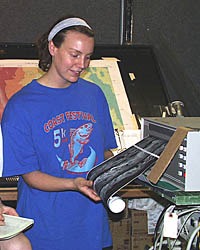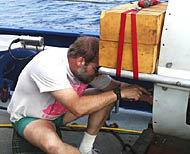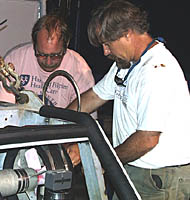|
|
Interviews: Bob "Yogi" Elder
Rachel:
It must have been hard moving around so much and having to leave your friends behind every time. What made you happiest when you were a child? Yogi: For as long as I can remember, I loved to tinker with things to see how they worked, to take them apart and put them back together, and to build things from scratch. Once I built a flying saucer spaceship out of a picnic table. That was fun, even though it never got off the ground. Rachel: Sounds like you were born to be an engineer! What did you do when you finished high school? Yogi: I went to college for 3 years in Georgia, at Southern Tech, and learned a lot about electronics among other things. Then I joined the Navy for 4 years, and was assigned to a destroyer tender ship (a support ship that travels with a naval destroyer ship). Our assignment was to fix anything that broke on the destroyer. I received additional training in electronics, and learned a lot about radar technology and cryptology instrumentation (devices used to code and decode messages transmitted to and from the destroyer when it is at sea). In my Navy classes, I was a top student, and that built up my confidence in my abilities. Rachel: Did you get to see much of the world when you were in the Navy? Yogi: Oh yes! I really liked that! Our ship put into many domestic and foreign ports, including Long Beach and San Diego, CA, Hawaii, Taiwan, Japan, Hong Kong, Singapore, and the Philippines. When we were in San Diego, I decided to check out a sailing class at the Coronado Sailing Club. That's how I met Peggy -- she was taking the same class. When I went back out to sea, we wrote to one another, and when I got out of the Navy, I stayed in San Diego and eventually we got married. We’ve now been married for 22 years and have 2 children, Kris and Genoa, 16 and 18 years old respectively. Rachel: Is that when you became a marine engineer? Yogi: No -- first I went to work for Burroughs (now Unisys), a very large company that designed and built mainframe computers. I worked with a small group of people in Rancho Bernardo, CA, doing research on bubble memory modules for computers. I enjoyed working with a small number of co-workers to design something useful. After working there for two years, I enrolled in San Diego State University. Two years later, I graduated with a B.S. degree in electrical engineering. By then, I had decided that I wanted to either pursue marine engineering, or work in the film industry on the technology of special effects for science fiction movies. The Star Wars films had just come out. I never forgot how much fun it was to build that flying saucer! But I never could make connections to the right people in the movie business. So, I called every firm in Sorrento Valley, CA, whose name had something to do with the ocean. I guess my love of sailing and my experience in the Navy had gotten me interested in ocean exploration technology. One of the firms I called said that they thought the Marine Physical Lab (MPL) at Scripps Institution of Oceanography in La Jolla, CA, might be looking for someone with my skills. I called Scripps, and in late 1980, I was interviewed for a position as an engineer with the Deep Tow Group (“Deep Tow” is a towed ROV developed by MPL in the early 1970's, and back then it could be considered a prototype for the Argo vehicle we are using now). It was pouring rain when I went for my interview. I showed up on time with my rain gear on. Dr. Fred Spiess, the MPL director, must have liked it that I was prompt and well-prepared -- there were 40 applicants, but I got the job. I worked with the Deep Tow Group until 1987. Then Bob Ballard hired me to work as an engineer at the Deep Submergence Lab of Woods Hole Oceanographic Institution. I couldn’t pass up the chance to help develop Argo and Jason into useful scientific research tools. I’ve been doing this for the past 12-13 years now. Rachel: What do you like the best about it? Yogi: I really love being part of a small group, doing something important, making it possible for scientists to explore and study the ocean floor. I especially enjoy the close relationships I develop with the people I’m working with, and am delighted by the resourcefulness of people when they are confronted with challenging problems -- both technical and scientific- that they must solve with whatever tools, supplies, and information are available to them on the ship.
|
||||||
|
|
|||||||
© 2010 Dive and Discover™. Dive and Discover™ is a registered trademark of
Woods
Hole Oceanographic Institution



